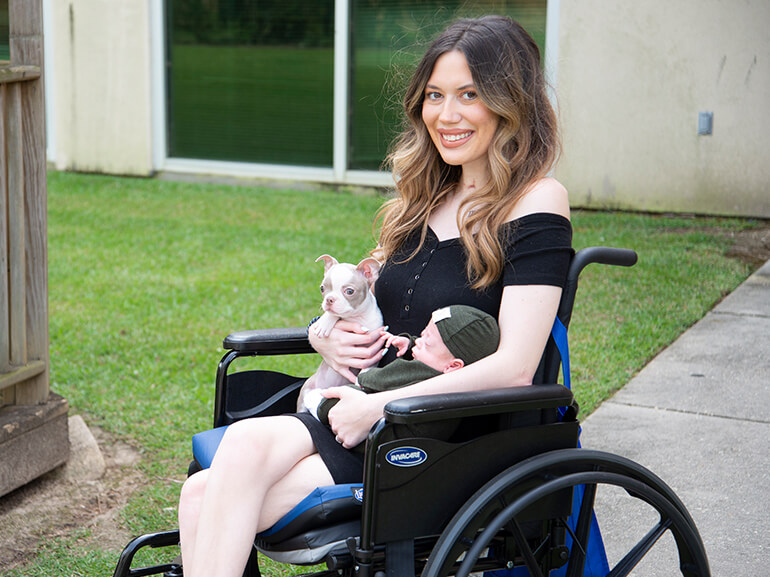Ally's Story

Ally Payne is a 24-year-old single mom who works full time as an online call center trainer. She lives in Covington, Louisiana, with her mom and adopted sisters who have special needs. One day while showering, Ally, who was 25 weeks pregnant at the time, noticed a pins and needles sensation that started in her hands and feet. Concerned for the health of both her and the baby, she went to St. Tammany Parish Hospital. By the time she arrived, the numbness had risen to her knees and elbows. The medical team performed a variety of tests, all which came back inconclusive, so she was sent home. The following day, Ally saw a neurologist who suspected Guillain-Barré syndrome and advised her to go to the emergency department immediately. The neurologist called the hospital ahead of her arrival and ordered a spinal tap and bloodwork. By the end of the day, she was no longer able to walk.
As the paralysis continued to move throughout her body, Ally was soon unable to breathe on her own. She was transferred to the Neuro ICU at Ochsner Medical Center and placed on a ventilator. She also received intravenous immune globulin (IVIG) therapy, a plasma product made up of antibodies to help the body fight infection and disease. After the first treatment, a small amount of feeling returned to her hands, fingers and head.
Unfortunately, Ally began showing signs of preeclampsia, a dangerous pregnancy complication characterized by high blood pressure, and a quick decision was made to transfer her to Ochsner Baptist where they performed an emergency cesarean section. Her baby boy, Silas, was born at 25 weeks weighing only 1 pound, 11 ounces. Ally was only able to spend about five minutes with Silas when he was six days old before being transferred back to the Neuro ICU at Ochsner Medical Center to continue receiving treatment for her condition. After her second round of IVIG, Ally noticed increased movement to her fingers.
Once strong enough, Ally’s medical team sent her to Northshore Extended Care Hospital, a long-term acute care facility, to begin therapy and continue her recovery. After 52 days, she was ready for more rehabilitation and chose Northshore Rehabilitation Hospital.
Upon admission, Ally began setting goals, including being able to walk and take care of Silas by herself.
During Ally’s stay at Northshore Rehabilitation Hospital, physical therapy worked on many aspects of her limited abilities. She started with three staff members helping her to stand in the parallel bars and used a standing frame to help with standing endurance. After performing leg exercises using therapy resistance bands and the SCIFIT stepper, Ally gained enough strength to use the overhead support harness and the rolling walker. She was also able to walk up and down four steps with assistance and walked up to 50 feet with a rolling walker with hands on assistance. The key turning point in Ally’s recovery was when she was able to walk using the parallel bars and an overhead safety harness. “The feeling of standing up again gave me the motivation to move forward,” said Ally.
In occupational therapy, Ally performed arm-strengthening exercises, eventually holding heavy objects so she would be prepared to hold Silas when she returned home. Therapists also taught her strategies to increase her independence with daily living activities. She began transfer training using a sliding board and progressed to stepping transfers with a rolling walker. Her team also helped her relearn how to take a shower, including opening shampoo bottles, something she was unable to do prior to coming to Northshore Rehabilitation Hospital. Initially, Ally needed two staff members to assist with showering because of her decreased trunk control but after several weeks of working on standing balance and endurance activities, she was able transfer and take showers unassisted. She was also very excited on the day she was able to make a cup of coffee on her own in the therapy gym while standing with a rolling walker.
Ally shared how her family played a huge role in her recovery process saying, “When you are paralyzed, you have to accept that other people have to assist you and it helped a whole lot that I had close friends and family I could trust to be by my side.” Throughout her journey, Ally’s mom was always there with a great deal of support. She ensured Silas was well cared for while he was in the hospital for several weeks and once discharged, Ally’s mom took care of him until she was able to return home.
After 36 days, Ally was able to return home and reunite with Silas. Because of the tremendous progress she made in therapy, Ally was able to walk with a rolling walker unassisted and take care of Silas seated from a wheelchair level without any help. She plans to continue her recovery in outpatient therapy.